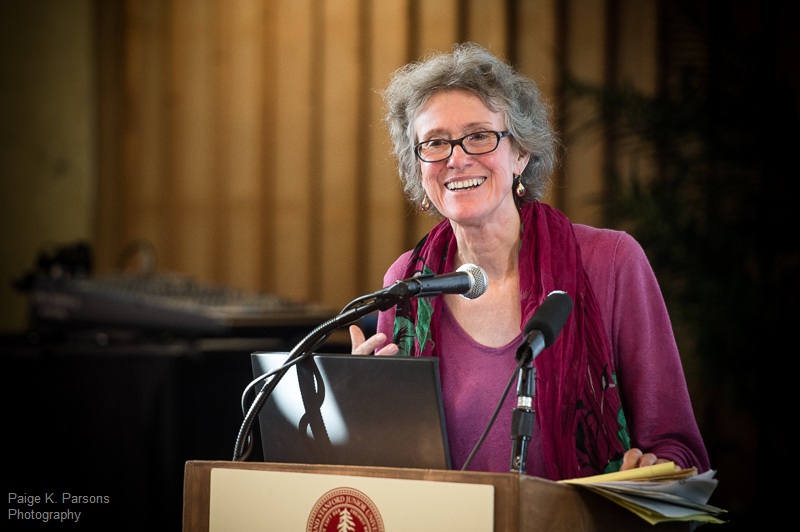
Arlie R. Hochschild
In a follow-up to her 2016 book on the rise of the right Strangers in Their Own Land: Anger and Mourning on the American Right (a New York Times best seller and finalist for the National Book Award), Arlie Hochschild's most recent book—Stolen Pride: Loss, Shame, and the Rise of the Right —takes her readers to Pike County, Kentucky. There, in the nation's whitest and second poorest congressional district, she finds residents facing a perfect storm. Coal jobs had gone and a deadly drug crisis had arrived. And in 2017, a white nationalist march was coming to town—a rehearsal, as it turned out, for the deadly Unite the Right march soon to take place in Charlottesville, Virginia. Once at the political center of the country, the district voted 80% for Donald Trump in both 2016, 2020, and 2024. Hochschild asks why this big shift took place and offers the reader a lens on the relationship between politics, shame, and pride. Stolen Pride was selected as one of President Obama's ten favorite books of 2024.
In other writing—such as her 2012 The Outsourced Self: Intimate Life in Market Times—she interviewed child and eldercare workers, internet-dating assistants, wedding planners, even a "wantologist." Her 2013 So How's the Family and Other Essays is a collection which includes essays on emotional labor—when do we enjoy it and when not?—empathy, personal strategies for handling life in a time bind, and the global traffic in care workers.
Earlier work has been based on field work among older residents of a low income housing project (The Unexpected Community), flight attendants and bill collectors who perform "emotional labor" (The Managed Heart), working parents struggling to divide housework and childcare (The Second Shift), corporate employees dealing with a culture of workaholism (The Time Bind), and Filipina nannies who've left their children behind to care for those of American families (Global Woman). Her work is available in 16 languages.
For activities, honors, and awards, please see her curriculum vitae (link above). For a brief introduction to her basic approach, please see the Spring 2008 issue of Contexts.
Selected interviews and articles
- "My Journey Deep in the Heart of Trump Country," The New York Times (June 2025)
- "Trump's first 100 days: 'In Kentucky I heard little about weakening democracy'" Le Monde (May 2025)
- "What's Giving Us Hope Right Now?" Greater Good Magazine, UC Berkeley (November 2024)
- "The Deep Story of Trumpism," The Atlantic (December 29, 2020) PDF
- "Emotional Labor in the Age of COVID-19," Scientific American (September 10, 2020) PDF
- "Emotional Labor Around the World," Global Dialogue, Volume 4, Issue 3 (September 8, 2014)
- "A Playful Spirit," The Swarthmore Bulletin (April 2013)
Recent book reviews
- "What's Wrong With the Meritocracy," The New York Times (September 15, 2020), Review of Michael J. Sandel's The Tyranny of Merit: What's Become of the Common Good? [PDF]
- "The Black and White Southerners Who Changed the North," The New York Times (September 27, 2023), Review of Max Fraser's Hillbilly Highway: The Transappalachian Migration and the Making of a White Working Class and Blair LM Kelley's Black Folk: The Roots of the Black Working Class [PDF]
- "A New Book Tracks the Rise of Right-Wing Extremism in the U.S.," The New York Times (September 13, 2022), Review of Luke Mogelson's The Storm is Here: An American Crucible [PDF]
- "How the White Working Class is Being Destroyed," The New York Times (March 17, 2020), Review of Anne Case and Angus Deaton’s Deaths of Despair and the Future of Capitalism [PDF]
- "The Homes in Dorian's Path Are in a High-Risk Area. Why Do They Cost So Much?" The New York Times (September 4, 2019), Review of Gilbert M. Gaul’s The Geography of Risk [PDF]
- "Male Trouble," The New York Review of Books (October 11, 2018) [PDF]
- "Liberals' woes run deep, but the way out is murky," The Washington Post (August 18, 2017), Review of Mark Lilla's The Once and Future Liberal [PDF]
- "How workers coped after GM shuttered its Janesville plant," The Washington Post (April 20, 2017), Review of Amy Goldstein's Janesville [PDF]
- "In 'Nomadland,' the Golden Years Are the Wander Years," The New York Times (November 17, 2017), Review of Jessica Bruder's Nomadland [PDF]
Recent op-eds
- "For JD Vance's Kentucky, Politics Is About Pride and Jobs," The Wall Street Journal (August 2, 2024) [PDF]
- "Is Donald Trump a bully or a bold protector? That depends on whom you ask," The Guardian (October 11, 2020) [PDF]
- “The secret to Donald Trump’s election strategy? Emotion, not policy,” The Guardian (September 2, 2020) [PDF]
- "When a Pandemic Strikes Americans Who Are Already Suffering," The New York Times (March 20, 2020) [PDF]
- "Think Republicans are disconnected from reality? It's even worse among liberals," The Guardian (July 21, 2019) [PDF]
- "More Republicans Than You Think Support Action on Climate Change," The New York Times (December 29, 2018) [PDF]
- "The Coders of Kentucky," The New York Times (September 21, 2018) [PDF]
- "To fix American democracy, the left should commit to these four steps," The Guardian (February 17, 2018) [PDF]
- "Robots are the ultimate job stealers. Blame them, not immigrants," The Guardian (February 14, 2018) [PDF]
- "Trump Has Divided the Country. Some Americans Are Trying to Bring Us Back Together," Time Magazine, online (January 19, 2018) [PDF]
- “Redefine the Flag” in “Fix This Democracy – Now,” The Washington Post (October 26, 2017) [PDF]
- "Donald Trump, 'The Apprentice,' and Secular Rapture," The Boston Globe (September 6, 2017) [PDF]
- "Donald Trump Loves Conspiracy Theories. So Do His Supporters," The Washington Post (November 7, 2016) [PDF]
Recent courses offered
Spring 2025, L&S 110: Brilliance of Berkeley
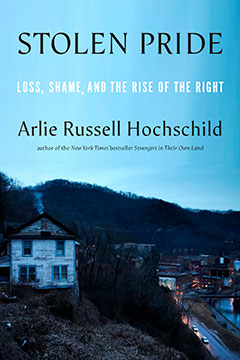
Stolen Pride: Loss, Shame, and the Rise of the Right (2024)
For all the efforts to understand the state of American politics and the blue/red divide, we've ignored what economic and cultural loss can do to an overlooked and powerful human feeling: pride. In Stolen Pride: Loss, Shame, and the Rise of the Right (The New Press), Arlie Russell Hochschild argues that Donald Trump has turned lost pride into stolen pride and channeled the pain of loss and shame into blame. She describes the emotional narrative through which Trump appears to "liberate" his followers even as he reveals his intention to undermine democracy "on day one."
Hochschild's research drew her to Pike County in the heart of Appalachia, within the whitest and second-poorest congressional district in the nation, where its residents faced a perfect storm. The county was reeling: coal jobs had left, crushing poverty persisted, and a deadly drug crisis struck the region more powerfully than anywhere else in the nation. Although Pike County had been in the political center thirty years ago, by 2016, 80 percent of the district's population voted for Donald Trump. Hochschild's brilliant exploration of how the town reacted to a 2017 white nationalist march through town—a rehearsal for the deadly Unite the Right march that would take place in Charlottesville, Virginia, just fourth months later—takes us deep inside a community that defies stereotypes.
Stolen Pride offers an original contribution to the national conversation on bridging divides and healing our nation.
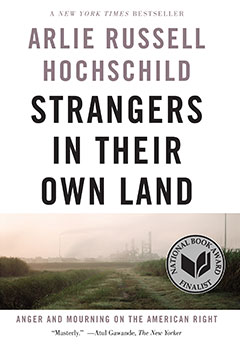
Strangers in Their Own Land: Anger and Mourning on the American Right (2016)
In Strangers in Their Own Land , the renowned sociologist Arlie Hochschild embarks on a thought-provoking journey from her liberal hometown of Berkeley, California, deep into Louisiana bayou country—a stronghold of the conservative right. As she gets to know people who strongly oppose many of the ideas she famously champions, Hochschild nevertheless finds common ground and quickly warms to the people she meets, among them a Tea Party activist whose town has been swallowed by a sinkhole caused by a drilling accident—people whose concerns are actually ones that all Americans share: the desire for community, the embrace of family, and hopes for their children.
Strangers in Their Own Land goes beyond the commonplace liberal idea that these are people who have been duped into voting against their own interests. Instead Hochschild finds lives ripped apart by stagnant wages, a loss of home, an elusive American dream—and political choices and views that make sense in the context of their lives. Hochschild draws on her expert knowledge of the sociology of emotion to help us understand what it feels like to live in "red" America. Along the way she finds answers to one of the crucial questions of contemporary American politics: Why do the people who would seem to benefit most from "liberal" government intervention abhor the very idea?
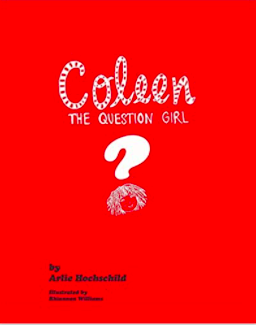
Coleen The Question Girl (2016)
"Coleen was born with a question in her mouth..." This children's book was first published in 1974 when Arlie Hochschild, sociologist and author, was the mother of a three year old. In 2016 it was rewritten, newly illustrated, and republished by Invisible Spaces of Parenthood.
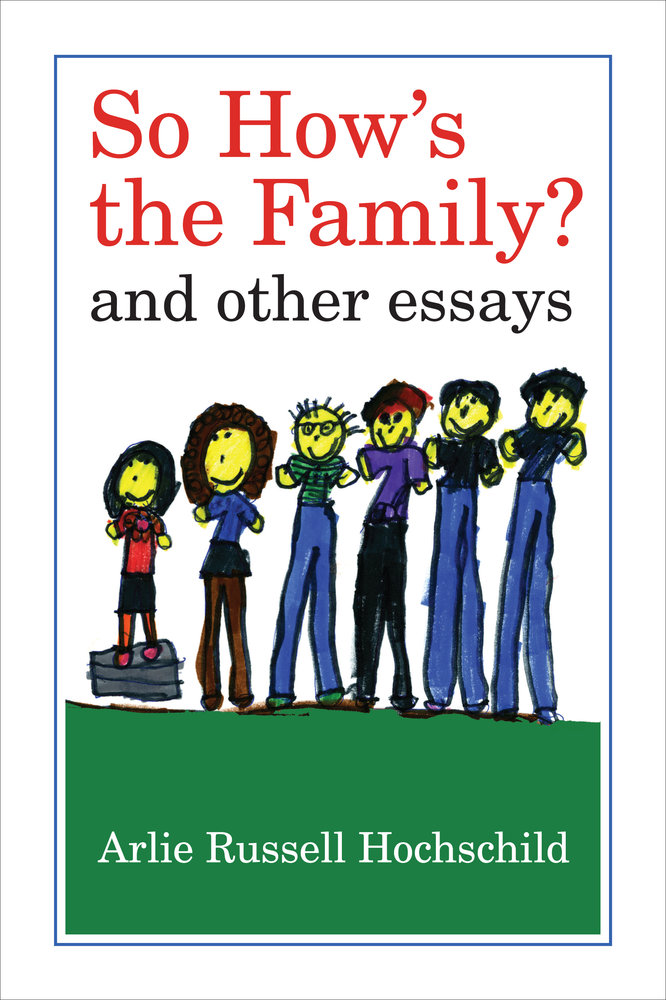
So How's the Family? And Other Essays (2013)
In this collection of thirteen essays, Arlie Russell Hochschild explores the impact of social forces on the emotional side of intimate life.
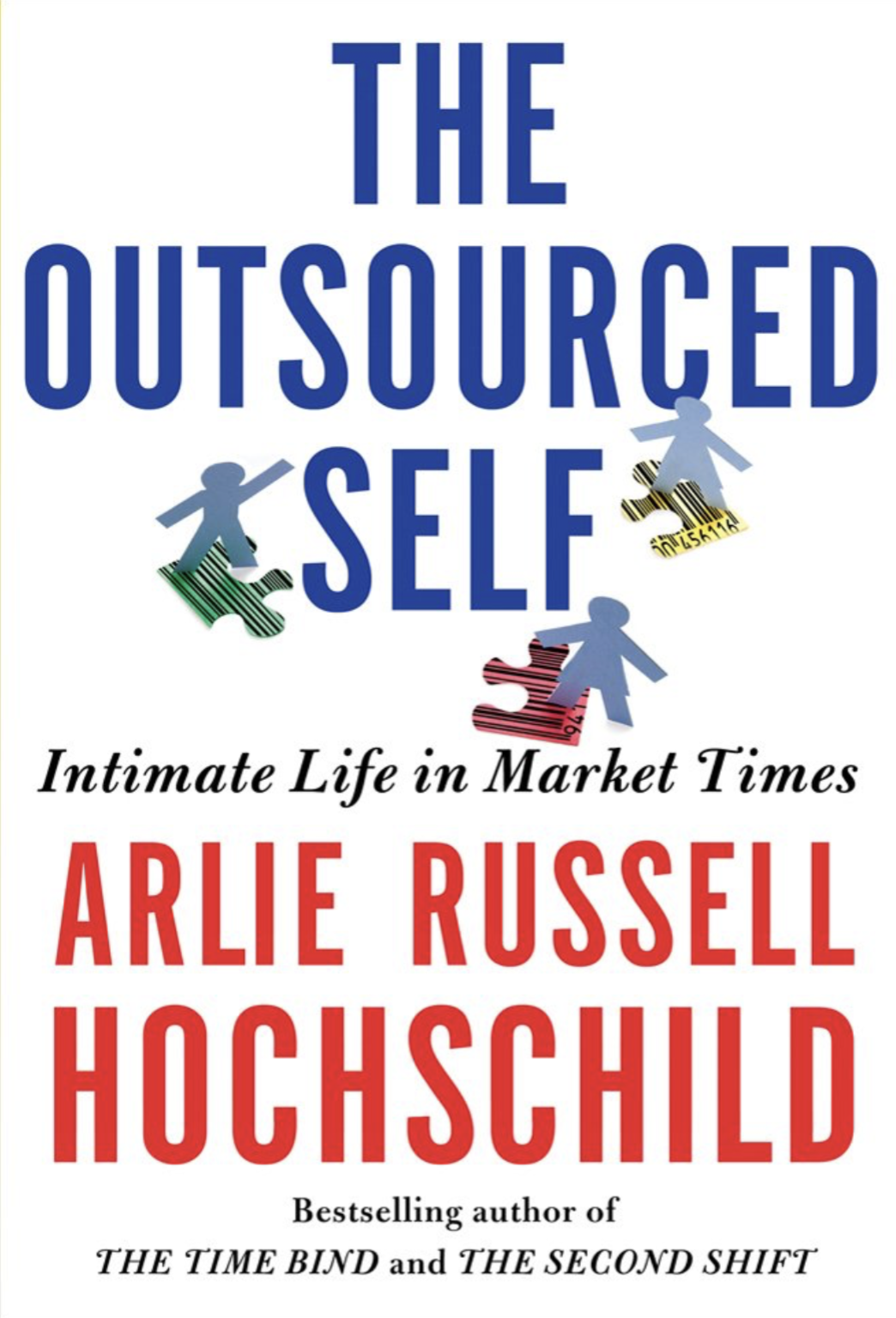
The Outsourced Self: Intimate Life in Market Times (2012)
The family has long been a haven in a heartless world, the one place immune to market forces and economic calculations. But here, drawing on hundreds of interviews, Hochschild reveals a world in which the most intuitive and emotional of human acts have become work for hire, often transformed into packaged expertise to be sold back to confused, harried Americans.
Read a review here (external link), and an excerpt from the book here (external link).
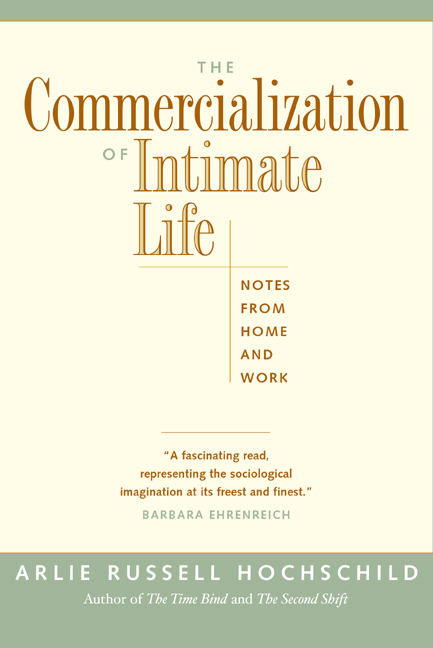
The Commercialization of Intimate Life: Notes From Home And Work (2003)
This book gathers some of Hochschild's most important and widely read articles in one place together with new work. Each chapter reflects the complex negotiations we make day to day to juggle the conflicting demands of love and work. Taken together, they are a compelling, often startling, look at how our everyday lives are shaped by modern capitalism.
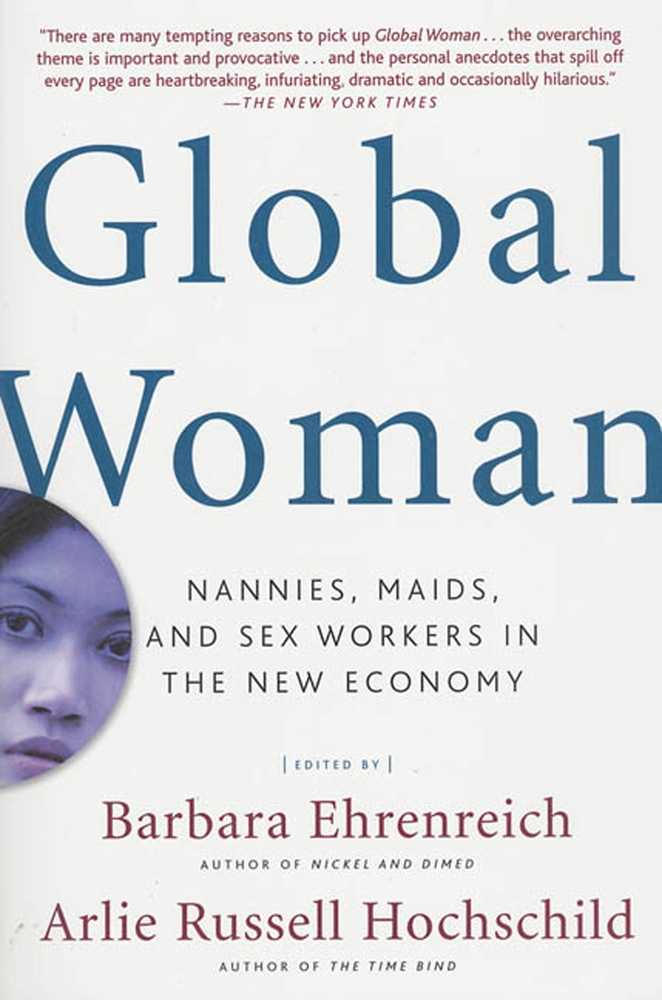
Global Woman: Nannies, Maids and Sex Workers in the New Economy (2002)
Co-edited with Barbara Ehrenreich, this volume explores the mass labor migration of women around the globe, easing a "care deficit" in rich countries, while creating one back home.
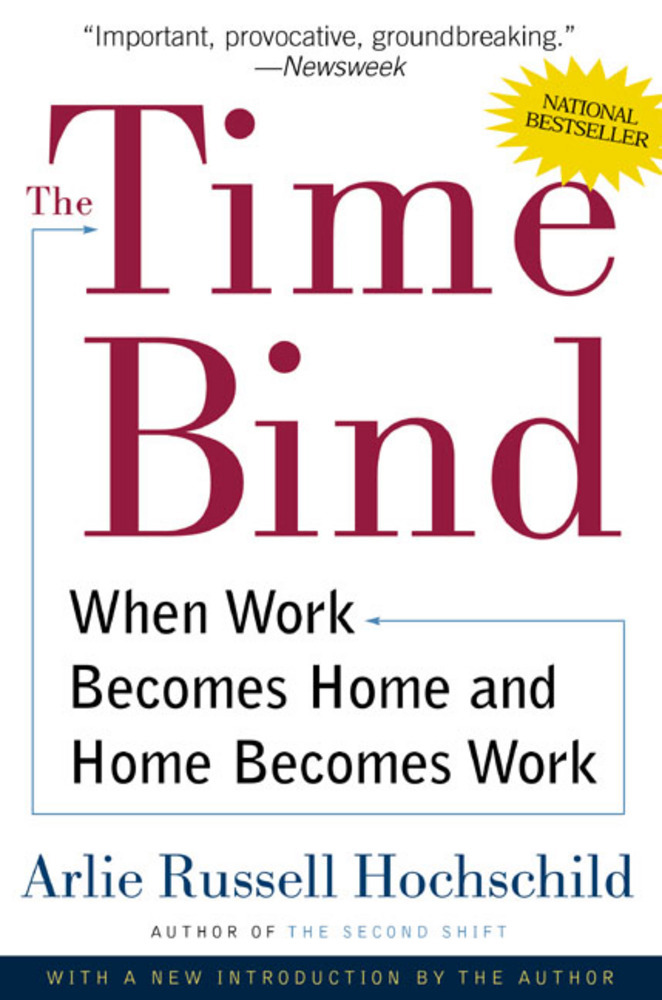
The Time Bind: When Work Becomes Home and Home Becomes Work (1997)
When The Time Bind was first published in 1997, it was hailed as the decade's most influential study of our work/family crisis. As she shows in her new introduction, the borders between family and work have since become even more permeable. The Time Bind stands as an increasingly important warning about the way we live and work.
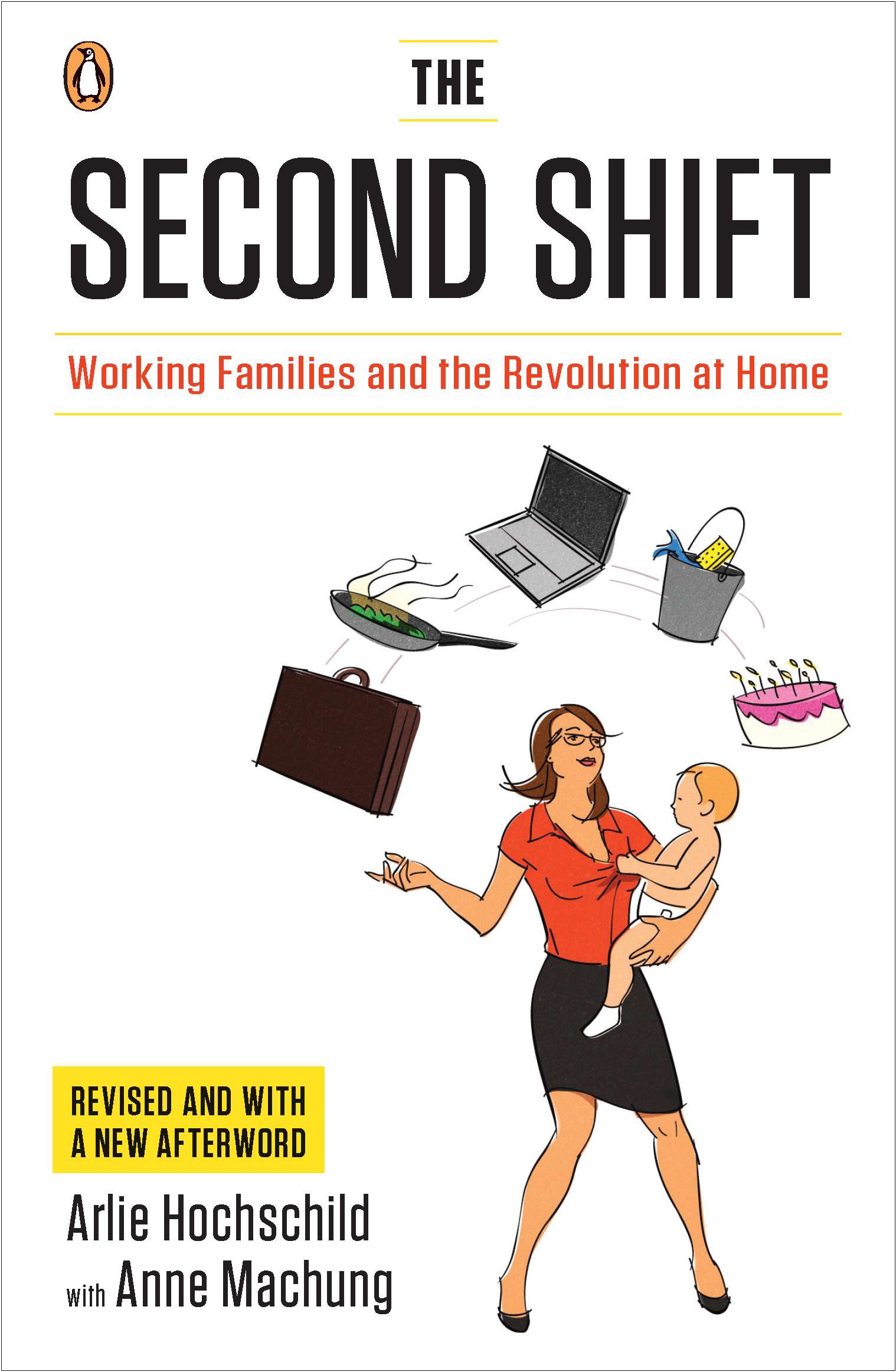
The Second Shift: Working Parents and the Revolution at Home (1989)
Over thirty years ago, Arlie Hochschild set off a tidal wave of conversation and controversy with her bestselling book, The Second Shift. Hochschild's examination of life in dual-career households finds that, factoring in paid work, child care, and housework, working mothers put in one month of labor more than their spouses do every year. Updated for a workforce that is now half female, this edition cites a range of updated studies and statistics, with an afterword from Hochschild that addresses how far working mothers have come since the book's first publication, and how much father we all still must go.
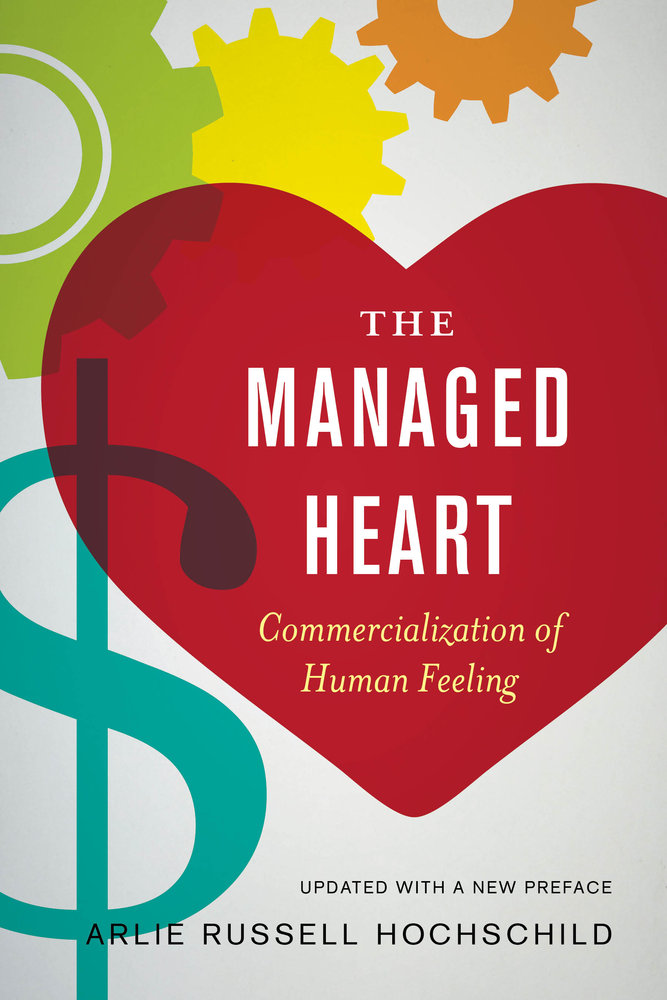
The Managed Heart: The Commercialization of Human Feeling (1983)
In private life, we try to induce or suppress love, envy, and anger through deep acting or "emotion work," just as we manage our outer expressions of feeling through surface acting. But what occurs when emotion work and feeling rules are introduced into the public world of work? Here Arlie Russell Hochschild closely examines two groups of public-contact workers: flight attendants and bill collectors. Hochschild argues that we have not appreciated the occupational hazard of emotional labor—estrangement from what one actually feels, the very means through which we are connected to those around us.
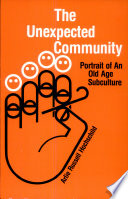
The Unexpected Community: Portrait of An Old Age Subculture (1973)
In this book, Arlie Hochschild paints an ethnographic portrait of the older residents of a low-income housing project. Through descriptions of their vibrant community—a mutual aid society, a source of jobs, an audience, a sanctuary, and a subculture with its own customs, gossip and humor—Hochschild suggests an alternative to both the quietly devastating isolation of old age, and private and individual solutions to what is a public and collective problem.
2016 "The Ecstatic Edge of Politics: Sociology and Donald Trump," Contemporary Sociology, Vol 45, Issue 6, pp. 683-689.
2016 "How the 'Great Paradox' of American politics holds the secret to Trump's success," The Guardian, September 7.
2016 "No Country for White Men" in Mother Jones Magazine, September/October.
2016 "The American Right: Its Deep Story," Global Dialogue, Volume 6, Issue 3 (September).
2008 "Feeling Around the World," Contexts, v7, n2, pp. 80-80. Reprinted in the Swedish Sociological journal, Sociologisk Forskning.
2005 "Feeling Capitalism: A Conversation with Arlie Hochschild: Conducted 5 May 2005," Journal of Consumer Culture, by Nicholas H. Wilson and Brian J. Lande, v5(3), pp. 275-288.
2005 "Love and Gold" (expanded version) in Feminist Politics, Activism and Vision: Local and Global Challenges, edited by Luciana Ricciutelli, Angela Miles and Margaret McFadden, London, Great Britain, Toronto, Canada.: Zed/Innana Books. This essay has also been translated into French by Laurence Bachmann for Nouvelle Revue Feministe (2004), reprinted in Sciences Humaines. It has also been translated into Polish by Znak, vLVII i6, 2005, pp. 41-63.
2004 "Let Them Eat War," European Journal of Psychotherapy, Counseling & Health, Volume 6, no 3, December, pp. 1-10. Also reprinted in William F. Grover and Joseph G. Peschek, Voices of Dissent (forthcoming).
2004 "Through the Crack In the Time Bind: From Market Management to Family Management" in The New Work Society, edited by Michael Hviid Jacobsen and Jens Tonboe, Copenhagen, Denmark: Hans Reitzels Publisher (in Danish).
2004 "The Commodity Frontier," in Self, Social Structure, and Beliefs: Essays in Sociology, edited by Jeff Alexander, Gary Marx and Christine Williams (Berkeley and Los Angeles: University of California Press), pg 38-56.
2004 "Emotional Labour in Health Care: Who Takes Care of the Caretaker?" Chapter 5 of Enriching the Art of Care with the Science of Care: Emotional and Interpersonal Dimensions of Health Services edited by Laurette Dubé, Guylaine Ferland, and D. S. Moskowitz, Montreal: McGill Queen's University Press, pp. 67-72.
2001 "Eavesdropping Children, Adult Deals and Cultures of Care" in Rosanna Hertz and Nancy Marshall (eds.) Working Families: The Transformation of the American Home, Berkeley and Los Angeles: University of California Press, pp.340-353.
2000 "Global Care Chains and Emotional Surplus Value," in On the Edge: Globalization and the New Millennium, edited by Tony Giddens and Will Hutton, London: Sage Publishers, pp. 130-146.
2000 "The Nanny Chain" cover article in The American Prospect, vol. 11 no. 4, January 3, pp. 32-36.
1993 "Inside the Clockwork of Male Careers, with a 1990s Postscript," Kathryn P. Meadow Orlans and Ruth A. Wallace (eds.), Gender and the Academic Experience: Berkeley Women 1952-1972, University of Nebraska Press, pp. 125-139.
1989 "The Economy of Gratitude," David Franks and Doyle McCarthy (Editors), Original Papers In the Sociology of Emotions, New York: JAI Press, pp. 95-113.
For a complete list of publications, please see Arlie's curriculum vitae (link above).